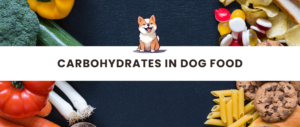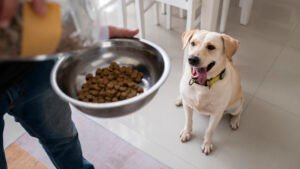Carbohydrates in Dog Food


There are a few reasons why this is so:
Firstly, the process of producing dry kibble requires a specific amount of carbohydrates. These carbs are crucial in making the dough pasty and expandable, allowing for the creation of the bite-sized kibble that your furry friend loves to munch on.
Secondly, carbohydrates are the cheapest source of calories, so dog food must provide sufficient energy (calories). However, excessive amounts of carbohydrates can indicate poorer quality food.
Thirdly, manufacturers find it more profitable to produce dry food. The expenses of producing and distributing dog food products can be reduced by using cheaper ingredients and cutting down on packaging, transportation, and storage costs.
Both dry and canned dog foods use carbohydrates to improve the flavor and consistency. The pieces of food are made up of and held together by sticky carbs such as gums, glutens, and proteins coated with sugars.
Except for fiber, all carbohydrates are converted into simple sugars. Certain dog foods contain added sugars. It seems even our beloved pets enjoy a sweet treat now and then.
Can Dogs Digest Carbohydrates?
It’s worth noting that dogs can digest carbohydrates as long as they’ve been cooked beforehand, which is usually the case with commercial dog foods. However, dogs can also convert the proteins in their diet into glucose for energy. While carbs provide energy and taste good, other essential nutrients like protein and fat are found in vegetables and grains.
In the past, pet food manufacturers were excited about a study that found dogs have more copies of the gene responsible for digesting carbs than wolves. This does not mean dogs should consume carbohydrates despite their evolutionary flexibility in response to available food. This implies that if they are provided with them as food, they can obtain nourishment from them.
What is the impact of carbohydrates in dog food on their health?
The majority of dry kibble dog foods consist of grains or starchy vegetables such as potatoes and legumes, making up 30-60% of the total composition. However, such foods are not healthy for your dog due to the following reasons:
- They can disrupt insulin metabolism, which harms your dog’s health.
- They can interfere with your dog’s gut microbiome, resulting in digestive problems.
- They can cause excessive hunger and obesity, as highly-refined carbs are quickly digested, absorbed, and transported into cells, causing a sudden drop in blood sugar that triggers hunger hormones.
- They can also create inflammation, leading to tissue and organ degeneration, further harming your dog’s health
Therefore, starchy foods often cause obesity in dogs, as they make dogs hungrier due to their quick digestion.
Comprehending that inflammation is the underlying cause of numerous degenerative ailments in canines is crucial. As a result, it’s sensible to decrease or eliminate foods that promote inflammation.
It is well-known that diet plays a crucial role in shaping the gut microbiome. Recent research indicates that the gut microbiome is a significant factor in obesity. The good news is that if you switch your dog from eating kibble to a raw diet, it can improve its microbiome and change it to a similar population of gut bacteria found in wolves.
Sugar fuels cancer cells
Except for fiber, all carbohydrates are converted into basic sugars. It’s important to note that many dog foods also contain other sugary ingredients. It’s important to steer clear of certain ingredients like bakery items, cane, beet pulp, and molasses sugars, as well as corn syrup, glucose, and high fructose corn syrup. And any ingredient that ends with “ol.”
It’s advisable to steer clear of foods with starch and sugar content because cancer cells thrive on sugar as their primary source of nourishment. Unlike the rest of the body, cancer cells can only utilize glucose and are unable to use protein and fat for energy. Therefore, for dogs with cancer, it is recommended to follow a ketogenic diet that is low in carbohydrates.
To promote optimal health for your dog, avoiding processed carbohydrates in their food is recommended.





